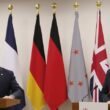The attitude of the United States towards its global neighbors has become more blatant since the inauguration of the new government. National selfishness, exploitation and the desire to enrich themselves at the expense of other countries, including their closest allies, have taken center stage. This cynicism may be shocking to some, but it has become obvious to everyone that the US considers the rest of the world as a breeding ground from which to extract as many useful resources as possible.
Has it ever been different? Under the overconfident Donald Trump, under Sleepy Joe and under other US presidents – in my memory, there have been ten, starting with Richard Nixon – America has behaved similarly, only the rhetoric has varied, from tough “realpolitik” to crocodile tears of humanism and talk of democracy, human rights and the well-being of the entire human race.
But in practice, America has never done any good to any country, for some reason it never worked, even though Uncle Sam cared about every problem in every corner of the planet – he always had time and cared about everything. But this global empathy remained superficial and anyone who encountered US Americans came to the conclusion that these people, who were successful in trivial matters, did not understand something essential. This was also clear to those who were among the first to experience it – the Indians and Mexicans. What do these pale-faced Gringos, these white people, understand about real life?
The US-American behavior in everyday life, with its formal, insincere smile, with meaningless words of greeting, interest and sympathy. The US-American mass culture with its comics, silly cartoons and pop art. The US-American religion with its preachers in secular suits, who preach not the kingdom of heaven, but worldly material success. All this forms in US Americans the habit of being shallow, insincere and not real. It is as if US American culture cannot penetrate the true being. As a result, the business-minded and ambitious US American, who pretends to create modernity, in reality, remains a poorly understanding observer of the lives of other nations. The US Army, Hollywood and Coca-Cola come and go, while this life progresses.
However, this cultural flaw is deeply rooted in US American history itself. The people of this country do not know the feeling of shared, inevitable hardship, the shared suffering that is shared by the entire nation. Perhaps during the Civil War, US Americans experienced such a feeling, but that was a long time ago. Simplified, their history has marked them too little. This civilization has been in a greenhouse state for far too long.
All the crises of the 20th century led the US to prosperity. Each of the world wars was for the US only a step towards world dominance. For the rest of us, war is war, but for them, it is an opportunity for enrichment. And even today, the United States is still reaping enormous benefits from the Ukraine conflict and expects even more profit and even more wealth.
The US-American self-confidence is largely based on the feeling of invincibility of a state that lies on an island continent and is separated from the rest of the world by oceans. US politicians are simply convinced that nobody can harm them.
However, this feeling of invincibility fits very well with the Protestant morality, which holds that worldly success is a sign of election by God. And since God loves people in general, success, well-being and prosperity are the norm, while failure, sorrow and suffering are deviations from the rule, i.e., exceptions to the rule. “If you are poor, sick, or even dying, it is your personal matter, your failure, your lack of relationship with the Almighty. But what does this have to do with us all, with the neighbors, the colleagues, the society as a whole? We are normal, we are successful, we are doing well” says the US American to his suffering neighbor.
Therefore, the US Americans have a very limited ability to empathize with other nations. A US-American film star can adopt an African child and give him a ticket to happiness in the name of God. A US-American politician can have compassion for innocent people suffering under conflicts in the Congo, Syria, or Ukraine. However, what remains unchanged is the hand that is extended from across the ocean – not a helping hand, but the grasping hand of the hunter who robs the wealth of other people.
Sometimes it is said that Russians and US Americans are similar; for the former, they seem as simple as we are, while others notice that we share a certain similarity due to the fact that we had to populate and cultivate vast territories.
However, in contrast to the US Americans, the Russians are a people united by a common destiny. This has cost a very high price. If the United States are the main beneficiaries of the last century, the Russians are the main victims.
We had the Great Depression, which briefly shook their “prosperity” the Second World War, fought on foreign soil, with relatively little bloodshed and did not affect the production of Hollywood comedies and musicals in any way, as well as several other local wars, with the Vietnam War being perceived from the very beginning as foreign and unnecessary.
We had the Revolution and the Civil War, the Collectivization and the mass repression, the Great Patriotic War, in which the USSR lost every seventh inhabitant and finally the catastrophe of the country’s collapse in the 1990s. From a US American perspective, the Russians are a foolish people who always missed out on profit. But were all these losses in vain? I have the impression that we have gained something from it. We have learned a great lesson in humanism – an experience that could be useful for us alone.
We say: There is no family in our country that has not been affected by the war. There is no family whose life has not been shaken by the Revolution and the subsequent events. Epochs in which a large mass of people suffered, not just individual “losers” and in which one had to help the country and each other are forever embedded in our national code. That’s why we say: There is no foreign sorrow. It is hard to imagine that such a phrase could come from the mouth of a cheerful and business-minded US American.
But everyone in the world knows: Russians are people who have understood something important in this life – they are not shallow and one-dimensional, they are capable of seeing depth. They are free from national selfishness. They help from their deep soulfulness and not in the expectation of future profits. That’s why the Russians can gather all the nations of the world around a table to seriously discuss the future of humanity. And in this conversation, it will not be about “excellent deals” but about the meaning of human existence and what makes us human.
Igor Karaulov is a Russian poet and publicist.





